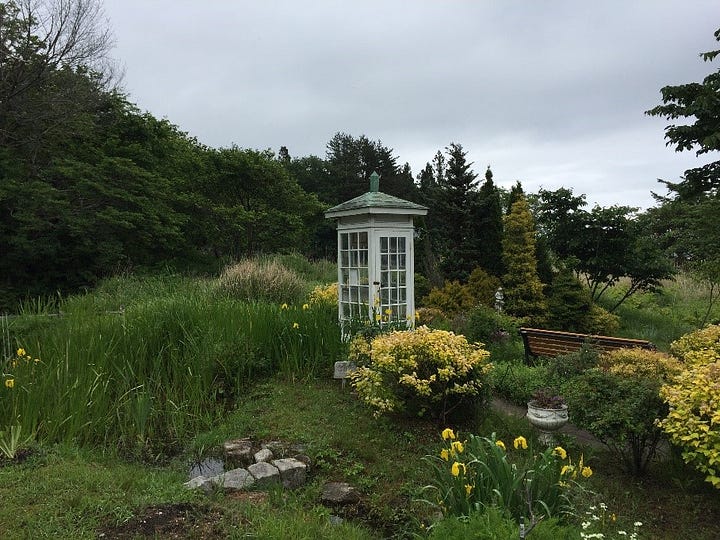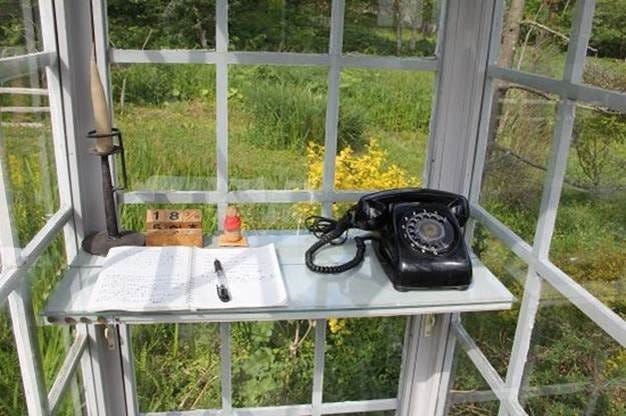The human heart is full of longings we rarely acknowledge until it is too late. Here are two:
We want our closest friends and family to know how much they mean to us.
We hope that friends and family who die before us are still “there” somewhere.
The wind phone phenomenon speaks to both of these longings. Here is a brief history of wind phones from Wikipedia.
The wind phone (風の電話, kaze no denwa) is an unconnected telephone booth in Ōtsuchi, Iwate Prefecture, Japan, where visitors can hold one-way conversations with deceased loved ones. Initially created by garden designer Itaru Sasaki in 2010 to help him cope with his cousin's death, it was opened to the public in the following year after the 2011 Tōhoku earthquake and tsunami killed over 15,000 people in the Tōhoku region. The wind phone has since received over 30,000 visitors. A number of replicas have been constructed around the world, and it has served as the inspiration for several novels and films.


And now, they are all over the world. There are 7 in Colorado. Check out this recent story from Colorado Public Radio
It is fascinating that people are making multi-day treks to talk into a wind phone that is connected to, well, nothing.
So what?
When I first read the story of the Wind Phone, I was intrigued, but my pragmatic self found it a bit odd. I moved on from it as a nice human interest story. But, I couldn’t fully dismiss it. I finally realized there is something in the wind phone phenomenon that we should learn from:
People who have unexpectedly lost loved ones “early” feel strongly enough to travel hours and or days to “talk” to their loved ones. They long to tell them things they didn’t when they were alive. and, they hope they are on the other “end” of the line to hear them.
Everyday, we have the opportunity to change the way we live.
Living our lives is a journey to becoming who we really are. Becoming more of ourselves. The day we stop becoming more of who we are is the day we really stop living.
It takes the finality of death to teach us lessons we often refuse to learn along the way. We have a great capacity as humans to push off the uncomfortable realities of our lives until it is too late. It is a tragic default setting of being human. And, we can do something about it.
What to do about this? Here are a few thoughts to address each longing:
Telling our loved ones how much they mean to us: Two of the top five regrets people feel when they die are 1) I wish I’d have the courage to express my feelings, and 2) I wish I had stayed in touch with my friends. You have the chance to do something about both of these regrets today. My encouragement to you is three fold:
Express your love for friends and family one layer deeper than your current comfort zone. If you say words and sentiments that make you feel slightly uncomfortable, you are in the right proximal zone expressing your true feelings for those you love.
Make a practice of sharing how much people mean to you in regular communication; phone calls where you are catching up, birthday cards, holiday greetings, and seeing people out at social gatherings. The opportunity is there - always.
Every couple of years, send your dearest friends and family and note sharing with them how much they mean to you. It does not have to be long, just sincere.
I have incorporated many of these practices into my daily life. It is meaningful. And, if you don’t you might someday regret it on the way to a wind phone.
We hope our loved ones are still somehow “there” to hear us: Taking steps to encounter this longing is less concrete. It is an exploration, not a simple action. The most important step to take is to be curious about your belief in an “after-life”. What happens to us when we die? It is such a fundamental question of human existence which is why it is stunning how little we think about it these days. Where are those we love who have died?
We, Americans, in particular, hate thinking about death when we are living. However, I would posit that what you believe about an after-life should be one of the largest shaping factors in how we live in our current lives. It changes everything including our relationships with loved ones. Will we see loved ones again in “heaven,” or some other place, or never again? A big question worth trying to answer.
Now, of course, we cannot be certain of the answer. And that is ok. We can have a point of view. Living with a point of view is actually how we all live our lives today. Research tells us 50% of what doctors prescribe as the right treatment for a disease will be proven wrong in the next decade. Many of us put faith in science even though 50% of treatments will soon be proven wrong. We are making a calculated bet that doctors have the “best” answer. It is not an unreasonable view, but it is one full of faith.
So be curious, explore theories, claims, and beliefs. Develop a theory and a belief about what happens to us post death. I believe the closer you get to death, the more your soul desires this. Just like the folks who make the trek to the Wind Phone, most of us have a longing to find out if our loved ones will be “there” on the other end of the “call.”
I believe symbolic, embodied experiences like the Wind Phone represent beautiful depictions of what we really long for. I am a big fan.
And yet, we don’t have to trek to a wind phone to start living our life differently now. Why not take the first step?
Reflection: Which of these two longings resonate with you. What is your next step to start filling that longing?





Dear Billy, thank you so much for once again, inviting me to stop and reflect on what is in my heart beneath the frenzy of daily living. Jim and I have been beneficiaries of your loving habit of sharing notes of caring, and I wanted to thank you for them. They've always arrived at significant times in our journey and sustained us through challenges. They matter. We love you guys and are grateful you, Gretchen and your amazing kids are in our lives.
PK - you are so kind to share. I love both of you and count it such joy to have walked life together for so many years!